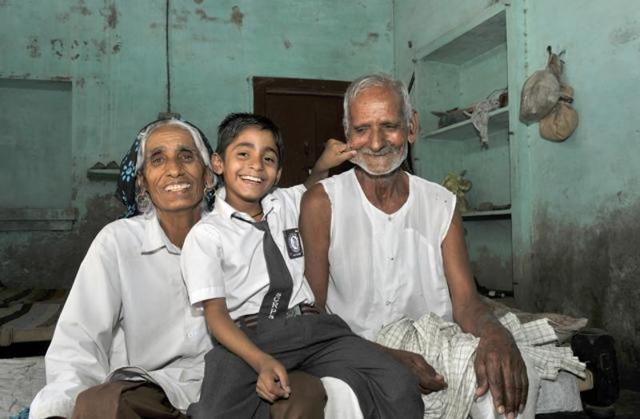By the way: Her name is Naveen, and she is their son
No matter that she’s actually a daughter, she is their son. Look, they wanted a son, and took the risk of the mother’s life to have her. She, therefore, has to be a son. And that’s how you use one of the most modern scientific procedures — in-vitro fertilisation or IVF — to satisfy the most regressive of your desires.
No matter that she’s actually a daughter, she is their son. Look, they wanted a son, and took the risk of the mother’s life to have her. She, therefore, has to be a son. And that’s how you use one of the most modern scientific procedures — in-vitro fertilisation or IVF — to satisfy the most regressive of your desires.

This is the story of Rajo Devi and Bala Ram, a 78-year-old couple in a Haryana village, who had their wish of having an inheritor fulfilled in 2009. They named her Naveen, a boy’s name otherwise. And she is dressed and treated ‘like a boy’, a phrase seen as a compliment by indulgent parents of daughters across northern India and beyond.
When my colleague Yojana Yadav — who wrote about such couples last week — asked him why they wanted to become parents at such an old age, Bala Ram said, “Kyun? Sabke 8-10 bachche ho sakte hain, hamara ek bhi nahin? (People can have 8-10 children and we can’t have even one?)... Manga ladka tha par ladki mili. Abhi toh ladke se bhi pyaari hai hamein yeh (We prayed for a son but got a daughter. But, to us, she is dearer than a son).” Rajo is paying with her health, having undergone two more operations since Naveen’s birth, and now nursing a cancer. They are banking on Rajo’s younger sister to take care of the child once they pass on.
Hopefully, Naveen grows up to be a strong girl, like a boy, when she’s old enough to know why her parents aren’t around to help in the most important decisions of her life.
Chameli Devi is another Rajo, in her 70s, and insisted, “Manne chhora aur chhori ek se laage hain (For me, the son and daughter are the same).” It’s a different matter that her eight-year-old twins, daughter Mansi and son Manish, are both dressed as boys. Yojana also met Deva Thekedar, 63, who owns 25 acres; and whose wife Bhateri Devi, 63, had triplets via IVF in 2010. “We were blessed with two sons and a daughter; one of the sons died 20 days later.” Here too, son Bhupender and daughter Esha are dressed like boys, in identical clothes. Symbolism couldn’t get starker.
Besides romantic celebrations of the beauty of science fulfilling age-old desires, these instances also ignite a debate on whether there should be an upper age limit for IVF and other such ways of having kids. Why couldn’t they adopt? And doesn’t the law say daughters can inherit property too? Forget all that, I say.
Much beyond the questions of fertility, inheritance and the law, these stories shape the personal histories of such kids, who are destined to be orphaned at a young age, unless the parents defy age and logic. After all, we are in the 21st century, supposed to be the age of logic. The average age of Indian men is 64, while for women it’s 68. By the time these kids hit puberty, their parents would be in the tenth decade of their lives. Worse, if one has been raised like a boy, there is bound to be the added trauma brought about by sudden realisations.
Imagine being an orphan at the age of 10, too young to know what to do with life, and — if that’s not bad enough — confused about your gender identity; no matter that there are 25 acres in your name.
That reminds me of several instances from personal experience, such as that of a girl who wet her pants in school almost every day even when she was seven years old, as Naveen is now. Asked why, she told her mom she was confused about which loo to use, the boys’ or the girls’. She was no test-tube baby, but only the youngest of four daughters, result of a persistent effort to get a son.
Another classmate of mine was a victim of this just-like-a-boy phenomenon right up to the age of 20. For years she thought she was homosexual, which can be worse than actually being gay or lesbian in our Ramdev-infested homophobic society. When she got married, she was expected to become the exact opposite of what’s casually termed a ‘tomboy’; act all quiet and demure, concerned about what to cook for lunch, like a stereotypical small-town bahu, no more ‘like a boy’.
These three IVF stories, yet again, underline the utter extent of our patriarchal set-up, in which even biology is negated. There is no dearth of people seeing nothing “too deep” in these instances, and linking this raised-like-a-boy trend with security of the child. That only further underlines the social depravity. Shouldn’t we stop seeing these parents as poor creatures, some kind of victims of a larger social set-up that they find hard to defy? It’s high time they are called out for what they are — selfish, regressive, horrible people who perpetuate the very culture that they claim to be victims of. Shame on them.
aarish.chhabra@hindustantimes.com





